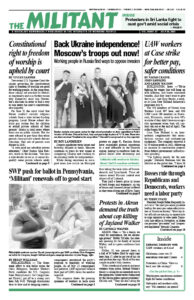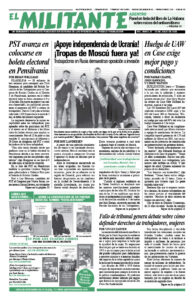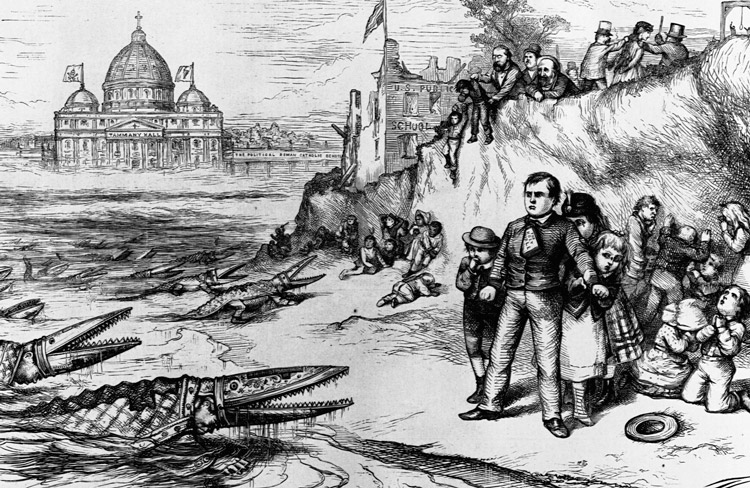Two recent U.S. Supreme Court decisions protecting the constitutional right to freedom of worship are good for working people. At the same time, these rulings are attacked by liberals as reactionary and as a further reason why Democrats must win November’s elections in order to find a way to take down the court’s constitutionalist majority.
On June 21 the court ruled that Maine couldn’t exclude religious schools from a state tuition-funding program. Local Maine school districts pay tuition fees for children to attend private schools of their parents’ choice in rural areas where there are no public schools. But the state refused to pay these fees when parents chose private schools that are Christian. Two sets of parents sued Maine in 2018.
“A state need not subsidize private education,” Chief Justice John Roberts, wrote in the decision, “but once a state decides to do so, it cannot disqualify some private schools solely because they are religious.” The issue here, the court decided, was the Constitution’s protection of the right to worship, not a case of separation of church and state.
In a dissenting minority opinion, Justice Stephen Breyer wrote, “With greater religious diversity comes greater risk of religiously based strife, conflict and social division.”
His view that the religious beliefs of working people are dangerous, echoes those of former President Barack Obama. In 2008 Obama complained that people who lost jobs in small towns in the Midwest “get bitter, they cling to guns or religion or antipathy to people who aren’t like them.” Liberals see working people as fundamentally bigoted, and think they need to find ways to control us, assaulting constitutional rights along the way.
On June 27 the court backed Washington state high school football coach Joe Kennedy, who sued after being fired in 2015 for leading prayers on the field after games. Kennedy had told students they were under no obligation to join the prayers and appointed two players who didn’t take part as team captains. But the school district instructed him to stop praying. Kennedy stopped leading prayers in the locker room and during the game, but continued kneeling to pray after the game. His contract wasn’t renewed.
The liberal press is beside itself claiming the Supreme Court is taking a hatchet to separation of church and state. In a dissenting opinion Justice Sonia Sotomayor claimed Kennedy’s actions caused “severe disruption to school events.”
Justice Neil Gorsuch wrote for the majority. “Here, a government entity sought to punish an individual for engaging in a brief, quiet, personal religious observance doubly protected by the free exercise and free speech clauses of the First Amendment,” he said. Under the school district’s interpretation, schools could “fire teachers for praying quietly over their lunch, for wearing a yarmulke to school, or for offering a midday prayer during a break before practice.”
The Constitution’s First Amendment, part of the Bill of Rights, states, “Congress shall make no law respecting an establishment of religion, or prohibiting the free exercise thereof.” That same amendment protects the right of free speech and the right to assemble — the right of working people to hear, say and discuss with others what we want, without government intervention.
These decisions help address the long history of state laws and court decisions that have cut across rights of individuals to worship as they see fit, laws that are used to divide the working class.
Thirty-seven states still have some form of “Blaine Amendment” on their books, provisions adopted in the 19th century as part of the rise of anti-immigrant and anti-Catholic bigotry aimed at the rapidly growing Irish Catholic population. In Maine, one Catholic priest was tarred and feathered. In Alabama and Georgia, the Ku Klux Klan became one of the principal backers of these laws, recognizing them as an effective way to marginalize not just Catholics, but also Blacks and Jews.
These amendments are named after Republican politician James G. Blaine from Maine, who championed an effort to amend the Bill of Rights to bar any funding for Catholic schools. It narrowly failed. At the time, most public schools were unapologetically Protestant. Blaine pushed the measure as part of preparing a run for president.
Some bigoted politicians pushed ahead and passed similar amendments to their state constitutions. But most of the Blaine amendments come from a federal law passed later that required territories seeking to become new states to adopt such language.
It took until 2017 for the Supreme Court to overturn New Mexico’s Blaine law. It did so in a court ruling that overturned a ban on borrowing books through the state’s book lending program at religious schools mostly attended by Hispanic and Native American students.
In recent decades Democrats have turned to the Supreme Court under a liberal majority to legislate policies they’ve been unable to get through Congress. They want the court to act as if it was a legislative body, not a separate third branch of the federal government with its system of checks and balances whose function is to defend constitutional rights. They are furious with recent court rulings that say that if either the Democratic or Republican party want to change laws, then they need to go out and win a majority to pass them in Congress. Liberal media like the New York Times frequently carry opinion pieces arguing the U.S. is divided along an ever-sharper Red-Blue axis, claiming the government faces an imminent takeover by a Christian-based far right that must be stopped at all costs. But the sharpening disputes on rights and laws roiling U.S. politics isn’t “Red-Blue,” it’s the class struggle driving battles in all government bodies.
“The stakes are high for working people in defending constitutional rights, including freedom of worship,” Sam Manuel, Socialist Workers Party candidate for governor of Georgia, told the Militant. “They provide protections from government interference, as working people seek to unite to defend ourselves and our families — in rural areas and cities — to fight for better wages and working conditions, health care, child care and campaign against the rulers’ wars.”


